
Rampage World Tour is an arcade video game released by Midway Games in 1997 as the sequel to Rampage. It was developed at Game Refuge by Brian Colin and Jeff Nauman, who designed the 1986 original. Ports were released for the Sega Saturn, Nintendo 64, Game Boy Color, PlayStation, and Microsoft Windows. It was re-released on Midway Arcade Treasures 2 and included in Rampage: Total Destruction.

Overboard! is a top-down adventure game, released by Psygnosis for the PlayStation and Microsoft Windows in 1997. It employs a light-hearted, all-ages piratical theme. A relatively low-key release for Psygnosis, the game was met with mixed reviews.
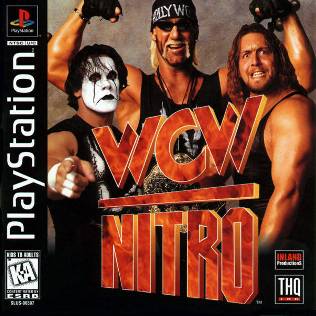
WCW Nitro is a professional wrestling video game based on the television show WCW Monday Nitro. Released by THQ for the PlayStation game console in 1998, the game featured a large roster of playable WCW wrestlers as well as full motion video clips of the television show. The game was followed by WCW/nWo Thunder, which was based on Nitro's Thursday night counterpart. Ports for Nintendo 64 and Microsoft Windows were released later in 1998 and 1999 with the updated roster featured in Thunder.

Aero Fighters Assault is an arcade-style combat flight simulator developed by Paradigm Entertainment and published by Vic Tokai and Video System for the Nintendo 64 in 1997.
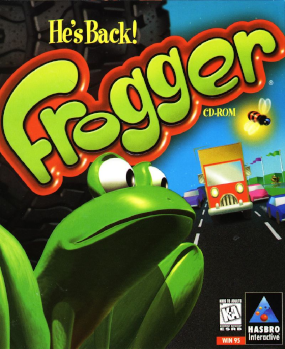
Frogger, also called Frogger: He's Back!, is a 1997 action game developed by SCE Studio Cambridge and published by Hasbro Interactive. It is a remake and expansion of Konami's 1981 arcade game of the same name. It has large maps, 3D graphics, and new gameplay moves. Critical reaction was mixed, with frequent criticism of the gameplay, controls, and difficulty, but the graphics were received positively. It was a commercial success, becoming one of the best-selling PlayStation games.

Nagano Winter Olympics '98, known in Japan as Hyper Olympics in Nagano, is a multi-event sports game from Konami. It is based on the 1998 Winter Olympics and features 10 Olympic events including skating, skiing, luge, bobsleigh, slalom, curling, halfpipe and snowboarding. The game is part of the Track & Field/Hyper Sports series and would be the last licensed Olympic video game released on a Nintendo home console until Mario & Sonic at the Olympic Games about nine years later.

Pitfall 3D: Beyond the Jungle is a platform game developed by Activision's internal Console Development Group and published by Activision in 1998 for the PlayStation and by Crave Entertainment for the Game Boy Color known as Pitfall: Beyond the Jungle in 1998. The game is part of the Pitfall series, following the 1994 installment Pitfall: The Mayan Adventure. It was first unveiled in 1996, when 3D platform gaming was still in its infancy, making designing the game a challenge. The PlayStation version development team included staff from the Virtua Fighter series, which was a pioneer in 3D gaming, but personnel changes led to Pitfall 3D being repeatedly delayed, and upon release critics sharply disagreed over whether it was a successful effort at bringing Pitfall into 3D.

Gex: Enter the Gecko is a 1998 platform game developed by Crystal Dynamics for the PlayStation, Nintendo 64, Microsoft Windows, and Game Boy Color. It was released in 1998 and 1999 in North America, Europe, and Japan. The game is the second installment of the Gex video game series and the first with 3D graphics. Its protagonist, Gex, a TV-binging, wisecracking gecko, seeks to collect three types of remotes to unlock different TVs in the overworld that aid in the fight against his arch-nemesis, Rez.
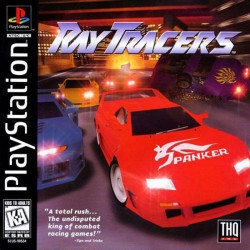
Ray Tracers is a 1997 vehicular combat video game developed by Taito and released for the PlayStation console. THQ published the title for its North American release in 1998. Ray Tracers has been compared to Taito's own Chase H.Q. from 1988. It was re-released on the PlayStation Network.
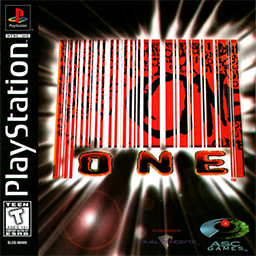
One is a video game released for the Sony PlayStation in 1997. The player controls John Cain, a man who awakes with no memory and one of his arms replaced by a gun, through a series of three-dimensional action stages. One was met with divisive reviews from critics, with some lauding its visuals, level designs, and cinematic feel, while others argued that frustrations with the gameplay ruin what had been a promising game. The game was released as a PSone Classic for download on the PlayStation Network on March 18, 2010.

NanoTek Warrior is a tube shooter game developed by American studio Tetragon Inc. and released by Virgin Interactive in 1997.
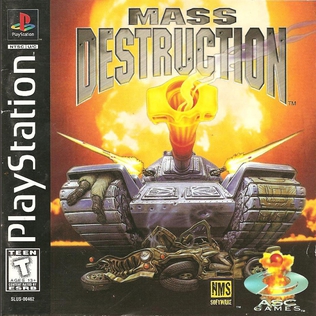
Mass Destruction is a 1997 third-person action game developed by NMS Software and published by ASC Games and BMG Interactive. Released for MS-DOS, the Sega Saturn, and the PlayStation, the game puts players in control of a tank, and tasks them with destroying enemy forces. It has often been likened to Return Fire.

Micro Machines V3 is a racing video game developed by Codemasters, the third title of the Micro Machines series following Micro Machines 2: Turbo Tournament (1994) and the first set in a 3D game environment. It was originally released for PlayStation in 1997 followed by ports to Microsoft Windows, Nintendo 64 in 1999, and a 2D version for Game Boy Color in 2000

NBA Fastbreak '98 is a basketball simulator released for the Sony PlayStation in 1997. It takes place during the 1997-98 National Basketball Association season. It was published by Midway Games and GT Interactive. Originally announced under the title "Hardwood Heroes", the game was released with minimal changes as NBA Action 98 on Sega Saturn and Microsoft Windows, published by Sega. Another version was being developed by Z-Axis for the Nintendo 64 under the title "NBA Fast Break 64", with a prospective November 1997 release, but it was cancelled.

PGA Tour 98 is a sports video game developed by NuFX and published by EA Sports exclusively for PlayStation in 1997. It was the last game in the series to not feature an athlete's name in the title until EA Sports PGA Tour in 2023.

Auto Destruct is a video game developed by the Swedish studio Neurostone and published by Electronic Arts. It was released for the PlayStation. The player takes on the role of a retired race car driver hunting down the fanatical cult that murdered his wife and daughter. The music was composed by English electronic producer Danny Briottet.

Arcade's Greatest Hits: The Midway Collection 2 is a compilation of arcade video games either made by, or acquired by Midway Games for the PlayStation and Windows. This game is technically the sequel to Williams Arcade's Greatest Hits, which also had Midway acquired games included, also released on the PlayStation.

NCAA Gamebreaker 98 is a 1997 American football video game developed by Sony Interactive Studios America and published by Sony Computer Entertainment for the PlayStation. It is the sequel to NCAA Gamebreaker and was released only in North America.
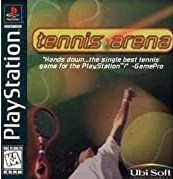
Tennis Arena is a video game developed by British studio Smart Dog and published by Ubi Soft for the PlayStation and Sega Saturn in 1997-1998. The Saturn version was released only in Japan.

NHL Powerplay 98 is a sports video game developed by Radical Entertainment and published by Virgin Interactive and Sega for Microsoft Windows, PlayStation, and Sega Saturn in 1997. It is the sequel to NHL Powerplay '96; there was no "'97" entry in the NHL Powerplay series. After Virgin opted not to release the game for the Sega Saturn, Sega acquired the rights and published the Saturn version under the title NHL All-Star Hockey 98 so as to make it a continuation of Sega's own NHL All-Star Hockey series.




















